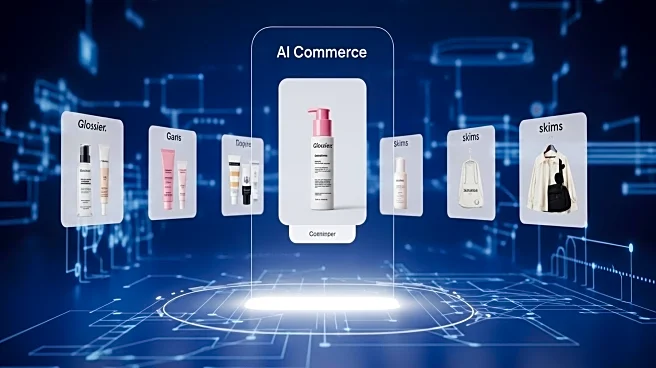What's Happening?
ChatGPT has launched a new shopping feature that allows users to purchase products from brands like Glossier and Skims directly through the AI interface. This development is powered by Stripe's marketplace payments platform, which facilitates transactions using Shared Payment Tokens (SPTs) to ensure secure processing. The feature, known as Instant Checkout, represents a significant shift towards AI-driven commerce, effectively turning ChatGPT into a digital storefront. Market intelligence from Sensor Tower indicates that shopping is a rapidly growing category within ChatGPT, with shopping-related searches doubling from January to July 2025. The integration of the Agentic Commerce Protocol (ACP) ensures that orders are seamlessly incorporated into merchants' existing systems, maintaining their current payment and fulfillment processes.
Why It's Important?
The introduction of shopping capabilities within ChatGPT marks a pivotal moment in the evolution of e-commerce, potentially reshaping how consumers interact with brands online. By integrating popular brands like Glossier and Skims, the platform taps into a significant market segment, appealing to tech-savvy consumers who prefer streamlined, AI-assisted shopping experiences. This move could influence other companies to adopt similar AI-driven commerce solutions, potentially altering the competitive landscape of online retail. For businesses, this represents an opportunity to reach a broader audience and enhance customer engagement through innovative technology. Consumers stand to benefit from a more convenient and personalized shopping experience, potentially increasing their loyalty to brands that embrace such advancements.
What's Next?
As ChatGPT's shopping feature gains traction, it is likely that more brands will join the platform, expanding the range of products available for purchase. This could lead to increased competition among AI platforms to offer similar services, driving further innovation in the sector. Businesses may need to adapt their strategies to incorporate AI-driven commerce solutions, potentially investing in technology and partnerships to remain competitive. Additionally, consumer behavior may shift as they become more accustomed to AI-assisted shopping, influencing future trends in e-commerce. Stakeholders, including retailers and technology providers, will be closely monitoring the impact of this development on sales and customer satisfaction.










